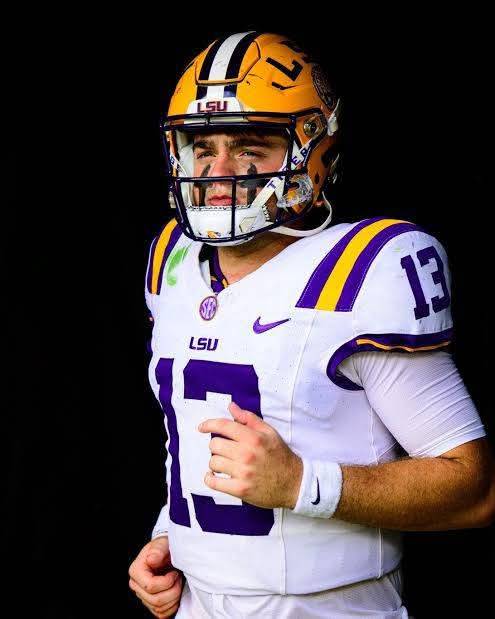In an era when college football is increasingly shaped by transfer portals and Name, Image, and Likeness (NIL) deals worth millions, the decision by LSU quarterback Garrett Nussmeier to reject a reported $4.5 million NIL offer from Alabama has sent seismic ripples across the landscape of college athletics. In choosing to remain loyal to LSU—a program he’s been committed to since 2020—Nussmeier has challenged the notion that money is the ultimate driver in collegiate athletics.
This move is more than a personal decision. It is a powerful statement about identity, allegiance, and the values that can still define college football. In a time when loyalty often seems like an antiquated virtue, Nussmeier’s choice is an unprecedented show of commitment and character, placing him squarely at the heart of a national conversation about the direction of the sport.
The Offer: $4.5 Million and the Crimson Tide
According to multiple reports, Alabama approached Garrett Nussmeier with an NIL package reportedly valued at $4.5 million, designed to entice him into transferring to Tuscaloosa for the 2025 season. The Crimson Tide, under new head coach Kalen DeBoer, are in the midst of a rebuilding phase after the departure of several key players and Nick Saban’s retirement. With uncertainty at the quarterback position, Alabama was seeking a proven, mature presence behind center—someone who could lead and win immediately.
Nussmeier, who had shown flashes of brilliance at LSU, particularly in his MVP performance in the 2024 ReliaQuest Bowl, was an ideal target. Strong-armed, experienced, and possessing a deep understanding of SEC defenses, he would have stepped into a ready-made offense with a chance to compete for a national championship.
Yet, despite the money and the prestige of the Alabama program, Nussmeier said no.
Why He Stayed: Loyalty, Legacy, and Leadership
The motivations behind Garrett Nussmeier’s decision are rooted in more than just football. In interviews and statements, the redshirt junior has repeatedly emphasized his love for LSU, his teammates, and the Baton Rouge community.
“This is home. These are my brothers. I didn’t come to LSU to wear the jersey for a few games and cash out. I came here to build something, to win championships here,” Nussmeier said in a recent interview with The Advocate.
He added, “Money can come and go. But legacy? Loyalty? That lasts forever.”
This kind of thinking is increasingly rare. With players now able to transfer freely and cash in on lucrative NIL deals, many see college football as a stepping stone or a financial opportunity rather than a place to forge lasting bonds or leave a lasting legacy.
For Nussmeier, who has patiently waited his turn behind Max Johnson and Jayden Daniels, the starting job at LSU in 2025 represents more than playing time—it represents the culmination of years of preparation, sweat, setbacks, and sacrifice. It’s not just about starting for LSU; it’s about being LSU.
Implications for LSU
Head coach Brian Kelly has praised Nussmeier’s maturity and resolve, calling him “the heart and soul of this team” and “a throwback in the best way.”
LSU fans have rallied around their quarterback, seeing his decision as a symbol of strength in a sport constantly in flux. Already, local businesses have stepped up with new NIL opportunities that—while not matching the Alabama offer—show a strong regional commitment to supporting players who prioritize loyalty.
With Nussmeier now locked in as QB1, LSU’s 2025 season outlook becomes significantly brighter. The Tigers are loaded with talent at receiver and running back, including elite returners like Kyren Lacy and Kaleb Jackson, and they have rebuilt their offensive line. In a crowded SEC, having a confident, experienced leader under center gives LSU a major competitive advantage.
Nussmeier’s decision may also impact recruiting. High school prospects often look to quarterback situations and team chemistry when choosing a destination. Knowing that LSU fosters an environment that builds loyalty, honors development, and respects commitment could sway top-tier recruits.
NIL and the New Normal: A Turning Point?
College athletics have changed drastically since the NCAA’s landmark decision to allow student-athletes to profit from their name, image, and likeness. NIL has introduced both opportunities and complications.
On the one hand, it offers athletes long-overdue avenues to capitalize on their talent and popularity. On the other hand, it has led to an arms race of sorts, where wealthier collectives and boosters can sway players to change teams with eye-popping deals.
The result has been a form of “NIL free agency”, where top players are constantly being courted, regardless of team fit or development plans.
What Nussmeier did flies in the face of this growing trend. He put values over valuation. For college football purists and coaches who have bemoaned the lack of continuity and identity in modern rosters, it’s a breath of fresh air.
“It’s rare. It’s admirable. And it should make everyone in Baton Rouge proud,” said ESPN analyst Greg McElroy. “Nussmeier had every reason to chase the bag. He stayed for the team.”
Could his decision mark a turning point? Perhaps not a full reversal of the NIL-dominated culture, but it may inspire other players to think twice before making a financially driven move. Loyalty is once again being celebrated—and visibly rewarded in intangible ways.
The Alabama Side of the Story
For Alabama, Nussmeier’s rejection is a significant blow. It signals that even the Crimson Tide—with all their resources, prestige, and infrastructure—aren’t immune to rejection. This is a new reality for powerhouse programs: players now have more leverage, and loyalty can beat luxury.
Kalen DeBoer will now look to develop one of his younger quarterbacks, such as Julian Sayin or Austin Mack, or re-engage with other players in the transfer portal. But missing on Nussmeier, who seemed like the ideal plug-and-play solution, exposes some of the volatility Alabama faces post-Saban.
Moreover, Alabama’s offer becoming public raises ethical and strategic questions. Was it wise to leak the details? Did it backfire by galvanizing Nussmeier’s commitment to LSU?
Public Reaction and the College Football Community
The reaction to Nussmeier’s decision has been overwhelmingly positive. Social media has been flooded with praise from fans, former players, and even rival coaches.
Former LSU quarterback Joe Burrow commented, “Proud of 13. That’s what being a Tiger means.”
NIL collectives from other schools have used Nussmeier’s story to highlight the importance of culture and connection over sheer monetary value. Meanwhile, some fans are calling for NIL reform, arguing that the current landscape too closely resembles professional free agency.
Even coaches around the country are pointing to the LSU quarterback as a role model.
“I’m going to show my QB room that story every spring,” said one Power Five coach anonymously. “That’s what college football should be about.”
The Future of NIL and College Football
Garrett Nussmeier’s decision is not a fix-all for the issues plaguing college football, but it’s a step toward rebalancing the scales.
The NCAA and conference leaders are still grappling with how to regulate NIL without stifling player rights. Ideas include revenue sharing, salary caps for collectives, transfer windows, and mandatory contracts for NIL deals.
Nussmeier’s situation could add urgency to these conversations. It shows that loyalty can still matter—but also highlights the dangerous extremes of unregulated inducements. If players are being offered millions just to switch schools, what’s stopping a full collapse of program stability?



